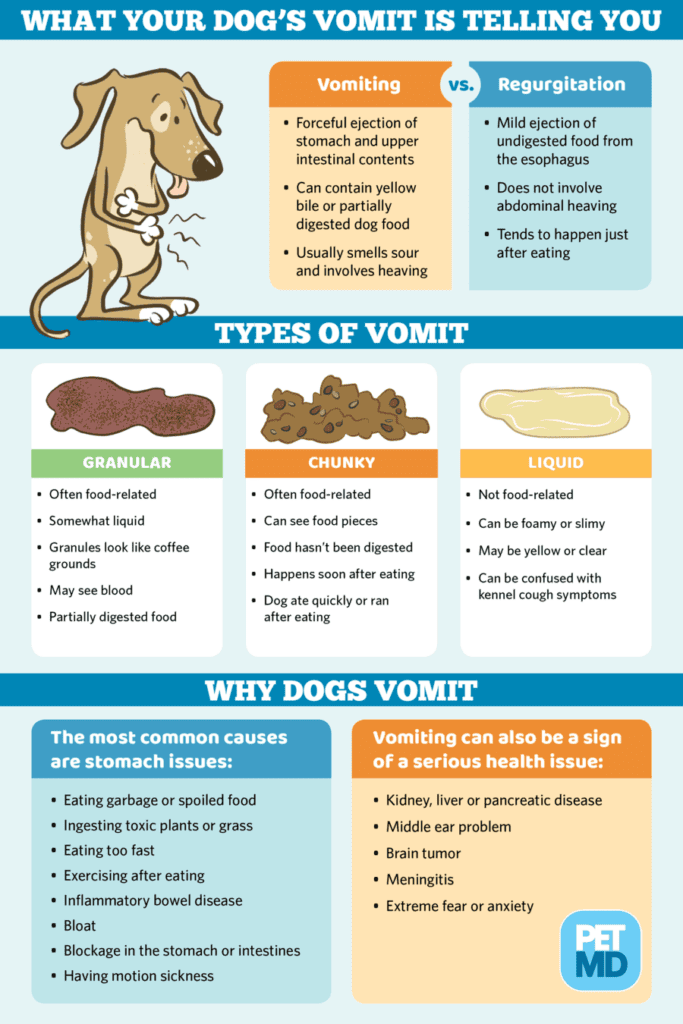Is there anything more unsettling than hearing your beloved Australian Shepherd start to retch?
While occasional vomiting might not always signal a serious problem, it’s crucial to understand why it’s happening and when it’s time to consult a vet.
In this article, we delve into the common reasons why your Aussie might be throwing up and what you can do about it.

Is Your Aussie Vomiting or Regurgitating? Understanding the Difference
Before we dive into the possible reasons for your dog’s vomiting, let’s first understand the difference between vomiting and regurgitation.
Vomitifng:
Vomiting is an active process. It involves noticeable abdominal contractions, and what comes up usually includes partially digested food along with yellow, green, or even brown bile.
Regurgitating:
Regurgitation, on the other hand, is a passive process. You’ll often see your Aussie merely open its mouth and out comes food or other substances, typically undigested and possibly covered in a slimy mucus. Regurgitating usually isn’t a sign your Aussie is sick or upset and it can happen completely randomly.
Recognizing whether your Australian Shepherd is vomiting or regurgitating can be instrumental in identifying the underlying problem.
6 Reasons Why Your Aussie is Throwing Up
Let’s get to the bottom of why your Australian shepherd is throwing up. The following six causes make up virtually all cases of canine vomiting, so consider which of the following is most likely to apply to your Aussie.
1. Ingesting Garbage, Foreign Objects, and Toxic Ingredients
Dogs, including Aussies, are notoriously curious and have a strong sense of smell. Unfortunately, this can lead them to ingest all sorts of things they shouldn’t. Garbage, foreign objects like toys or socks, and even toxic foods such as chocolate, grapes, or xylitol-containing products can lead to upset stomachs and vomiting.
If you suspect your Aussie has gotten into something it shouldn’t, it’s crucial to monitor its behavior closely. In cases of ingesting toxic foods or objects that can obstruct their digestive tract, it’s best to contact a vet immediately.
2. Heatstroke
Just like humans, dogs can suffer from heatstroke. Aussies, with their thick double coats, are especially susceptible in high temperatures. One of the symptoms of heatstroke in dogs is vomiting, along with heavy panting, bright red gums, and lethargy.
If you believe your Aussie might be suffering from heatstroke, immediately move them to a cooler location and try to gradually lower their body temperature with cool (not cold) water. This situation is a medical emergency, so it’s crucial to get them to the vet as soon as possible.
3. Eating Too Fast
Some dogs are fast eaters, and while it might seem cute or harmless, it can actually lead to vomiting. When a dog eats too quickly, they swallow a lot of air, which can result in gastrointestinal upset. In severe cases, it might even lead to a life-threatening condition called bloat.
To prevent your Aussie from eating too fast, consider using a slow-feeder bowl, which makes it a little more difficult for them to get their food, thus slowing them down.
4. Sensitive Stomach
Some Aussies may simply have a more sensitive stomach than others, which can cause them to vomit more frequently. This sensitivity might be due to certain foods, changes in diet, or even stress.
If you think your Aussie has a sensitive stomach, it may be worthwhile to consult with a vet to pinpoint the cause. They might suggest a dietary change or other strategies to help manage the condition.
5. Car Sickness
Just like people, some dogs also get carsick. If your Aussie starts drooling excessively or vomiting during car rides, they might be experiencing motion sickness.
There are several strategies to combat car sickness in dogs, like minimizing food intake before travel, gradually acclimating them to car rides, or using special doggy seat belts that reduce movement. In some cases, your vet may prescribe anti-nausea medication.
6. Underlying Health Issues
In some cases, frequent or severe vomiting might signal a more serious underlying health issue. Conditions such as kidney disease, liver disease, pancreatitis, or certain types of cancer can all cause vomiting in dogs.
If your Aussie is frequently throwing up, losing weight, lethargic, or showing other signs of illness, it’s important to consult with a vet as soon as possible.
How Often Is Your Aussie Throwing Up?
If your Australian shepherd is temporarily sick or experiencing an upset stomach, they shouldn’t be throwing up for multiple days.
If your Aussie is throwing up for more than one day, then it means there’s either an underlying issue OR the method you’re trying to help them isn’t the right one.
The short answer is that if your Aussie KEEPS throwing up for more than 1 day, then the safe guidelines is to contact your veterinarian.
According to BluePearl Vet Hospital, if your dog vomits multiple times in the same day, or is vomiting for more than one day, you should seek help from your vet right away.
What Kind of Vomit is Your Aussie Throwing Up?
Not all vomit is the same, and different types can indicate different issues.
For instance, clear or foamy vomit could mean your Aussie’s stomach is empty, possibly from not eating enough or eating too long ago. Yellow or green vomit typically indicates bile, suggesting the dog’s stomach was empty for too long.
If you see undigested food, it could indicate they’re eating too quickly or have a condition preventing proper digestion. In more serious situations, red or dark brown vomit could indicate blood, which requires immediate veterinary attention.
Check out this helpful graphic from PetMd

Aussie Vomiting: What to Do Next
Vomiting in Australian Shepherds is a matter of concern, but it doesn’t always require immediate veterinary intervention. There are a few initial steps you can undertake at home.
That being said, if your Aussie is vomiting repeatedly in a single day or consistently over several days, it would be prudent to consult with a veterinarian for further advice.
Something to try (veterinarian method):
- Firstly, withhold all food and water for about 2 hours. This step allows your Aussie’s stomach to settle down.
- After the 2-hour interval, slowly reintroduce water, giving your dog a couple of tablespoons every half hour. However, keep food away for another 6-8 hours.
- If the vomiting ceases after this period, you can gradually reintroduce small amounts of food, serving 1-3 tablespoons at a time every 2-3 hours. The food should be bland and easily digestible like plain boiled chicken breast, white fish, plain pasta, or white rice. Foods rich in fat, dairy products, and raw meat should be avoided at this stage.
- If your Aussie does not vomit again, you can start to gradually include a small portion of their regular food with the bland diet the next day.
- Over the next few days, slowly increase the proportion of regular food. Offering small meals 4-6 times daily is beneficial as these are more manageable for your Aussie’s digestive system to process.
Of course, if you are unsure of how to help your Aussie at home, waste no time in contacting your veterinarian.
Tips taken from Vets-Now.
Related Article: Australian Shepherd Diarrhea: What To Do Next
Why Burnt Toast Will Not Help Your Aussie
I’ve seen a lot of talk about how burnt toast helps dogs with upset stomachs. This is a myth, partly.
It’s thought that the burnt bits on the toast are activated charcoal, which aid in settling stomachs and removing toxins from the body.
The thing is, you can only get activated charcoal from burning special types of wood. Not food!
The reason why the toast could help, is simply because it’s plain and easy to digest. Still, there are better options out there when it comes to offering bland food (like plain boiled rice and chicken breast).
So, though you might have seen this tip advertised extensively, please do not try it with your Aussie. This is not a healthy way to recover from an upset stomach or vomitting
When to See a Vet
Vomiting isn’t necessarily a cause for panic, but knowing when to seek veterinary attention is critical for your Australian Shepherd’s health.
Here are some scenarios where a trip to the vet is strongly recommended:
- Frequent or Persistent Vomiting: If your Aussie is vomiting multiple times within a day, or vomiting continues over several days, it’s best to contact a veterinarian. Frequent vomiting could point to a more severe condition such as an obstruction or gastroenteritis.
- Presence of Blood in the Vomit: If you notice any blood in the vomit, whether it’s bright red or looks like coffee grounds (digested blood), seek immediate veterinary attention. This could be indicative of conditions like stomach ulcers, trauma, or even a systemic disease.
- Other Signs of Illness: If vomiting is accompanied by other signs of illness like diarrhea, loss of appetite, lethargy, changes in behavior, or noticeable weight loss, it’s crucial to consult with a vet as soon as possible. These symptoms could indicate a range of problems, from infections and parasites to serious diseases like pancreatitis or kidney disease.
- Dehydration: Prolonged or severe vomiting can lead to dehydration. Signs of dehydration in dogs include dry or tacky gums, increased heart rate, and lethargy. If your dog shows these signs, they should be seen by a vet immediately.
- Ingestion of Toxic Substances or Foreign Objects: If you suspect your Aussie has swallowed something harmful—whether it’s a toxic plant, a dangerous food like chocolate or grapes, or a foreign object like a toy or piece of clothing—it’s vital to get them to a vet as quickly as possible.
- Changes in Drinking or Urinating Habits: If your dog starts drinking excessively or urinating more or less than usual, coupled with vomiting, it could indicate conditions like diabetes, kidney disease, or liver problems. A vet should be consulted for proper diagnosis and treatment.
It’s always better to err on the side of caution when it comes to your Australian Shepherd’s health. Remember, you know your Aussie best; if you notice anything that feels out of the ordinary or causes you concern, don’t hesitate to contact your vet.
Last Thoughts
Remember, occasional vomiting in dogs can be normal. But if your Aussie is vomiting frequently, or if you’re just not sure, it’s always best to consult with a vet. Understanding your dog’s behavior and knowing when to seek medical help are crucial steps in ensuring your Aussie stays healthy and happy for many years to come.
